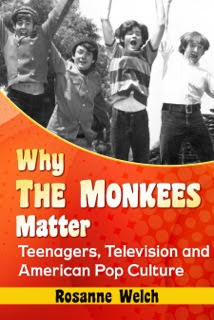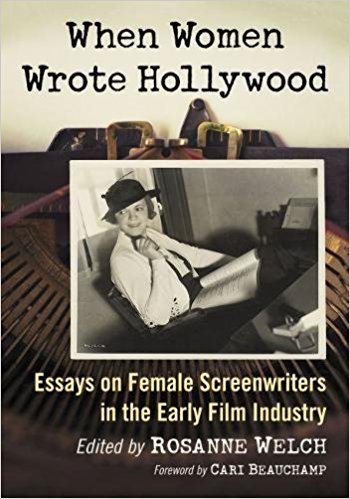Read Daughter, Wife, Widow, Screenwriter: The Heroines’ Journey of Dorothy Davenport
Read about more women from early Hollywood
Podcast: Play in new window | Download
Subscribe: RSS
On Screenwriting and Media with Dr. Rosanne Welch
Writing, Film, Television and More!
Congratulations to my friend and editor Anna Weinstein!
The first book in her “Screen Storytellers” series, which is on The Works of Shonda Rhimes is on Bloomsbury’s Essential New Books list for film students.
I’m proud to have a chapter in the book discussing the idea that while most people think Rhimes is ‘only’ a feminist, her writings have always expressed an even wider humanist philosophy.
I can only hope that my upcoming The Works of Susan Harris will make the same list. Look for it in late 2026.
Rosanne Interviewed About the History of Teen Idols on Cosmoetica
I enjoyed discussing the phenomenon and possible importance of Teen Idols across the generations with Dan Schneider for his Cosmoetica YouTube channel. Of course, he found me thanks to my book on The Monkees ( whose subtitle is “Teenagers, Television, and American Pop Culture”) and I was happy to report on the research I had done for the book about the rise of the term “teen ager” (post WWII when high school became mandatory), those who came before the Monkees (from Sinatra to James Dean to Bobby Sherman), and those who’ve come after (from the Jackson Five to Leonardo DiCaprio to Miley Cyrus).
I shared the panel with Fred Velez who has written about Monkees fandom and together we all delved into what participating in such fandom offers the audience, how streaming and the internet have changed such fandom, and who will be the most remembered teen idols of the century.
Born just 4 years after the end of the Civil War in Boonville, Missouri, the scripts Julia Crawford Ivers wrote (and sometimes directed) often tackled issues of prejudice. After the war, her family emigrated to Los Angeles. As with many female creatives in this era, Ivers used her screenplays to highlight women’s issues from forced marriage to domestic abuse to prejudice.
Read Julia Crawford Ivers: From Rich Widow to Writer-Director
Read about more women from early Hollywood
Podcast: Play in new window | Download
Subscribe: RSS
Born on Christmas Day in 1876 in Massachusetts, Dix and her family lived in various cities around the historic state until she moved to Cambridge, Massachusetts to study English and History at Radcliffe College. There she became the first female to be granted the Sohier Literary Prize, for the best thesis of a Harvard or Radcliffe student. From there it seemed a quick move into the world of writing.
Dix began with books about her favorite subject – the history that surrounded her in Massachusetts. In 1899, at the age of 23, she published Soldier Rigdale: How He Sailed in the Mayflower and How He Served Miles Standish. Her first play, A Rose of Plymouth Town ran for a month in 1902, followed by The Road to Yesterday, which ran for 8 months in 1907. Altogether Dix wrote 18 books and 5 plays before moving into the new world of film.
Read Meet Beulah Marie Dix: Award-Winning Scholar and Anti-War Novelist Turned Screenwriter
Read about more women from early Hollywood
Podcast: Play in new window | Download
Subscribe: RSS
The surname DeMille (or de Mille) brings up thoughts of the famous line from Billy Wilder and Raymond Chandler’s Sunset Boulevard “Mr. de Mille, I’m ready for my close up” which references silent screen director Cecil. Perhaps people remember his brother, William, who started as a playwright and became a Hollywood director and joined 3rd wife Clara Beranger in founding the film school at the University of Southern California. And sometimes the surname conjures of memories of Tony Award-winning choreographer Agnes de Mille (daughter of William/granddaughter of Beatrice). From now on it should bring up the writer, producer and mentor who worked frequently in both Broadway and Hollywood – Beatrice DeMille. (From here on out we will call her Beatrice to avoid confusion).
Read Writer, Producer, Agent, and Mentor (And Mom to the DeMille Boys)
Read about more women from early Hollywood
Podcast: Play in new window | Download
Subscribe: RSS
Save 35% on McFarland Books – One of My Publishers is offering a 35% Discount on Their Catalog This Week!
Along with your other holiday shopping over this Thanksgiving weekend, I’m happy to pass along this lovely discount from McFarland Publishing, the fine folks who published two of my favorite books:
Why The Monkees Matter: Teenagers, Television and American Pop Culture

AND
When Women Wrote Hollywood: Essays on Female Screenwriters in the Early Film Industry

Direct from the McFarland site, From now through December 2, they are offering a full 35% off ALL of their titles with coupon code HOLIDAY24 at checkout.
See the entire McFarland Catalog
You can buy one of my books — or any other cool pop culture book you find — for yourself or anyone else on your gift list this year.
Happy Holidays!